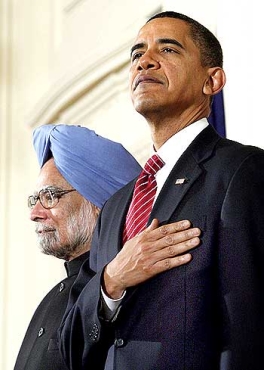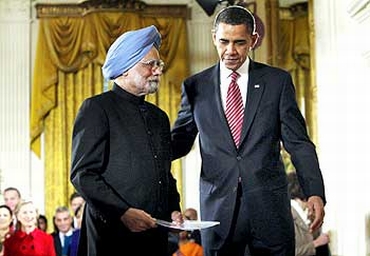Usually, when foreign leaders visit India or Indian leaders visit foreign countries, there are joint statements issued at the end of the summit which contain mostly platitudinous formulations about their shared values and worldviews. It has become a customary ritual to reserve some time for one-on-one exchanges between the leaders, followed by a formal meeting of the two delegations. Very rarely have Indian leaders after Jawaharlal Nehru discussed in detail with their foreign interlocutors their worldview and their views of the world.
This is understandable, as India was a poor developing nation whose words did not carry much weight. Today the situation is different. India has a trillion dollar economy that is growing by the day. It is expected to become the third largest economy in the world in the next two decades. By all forecasts, India is also likely to have the world's largest population, exceeding China's, and a youth bulge even as China begins to age.
Text: K Subrahmanyam
India and the US are pluralistic, secular democracies
Forecasters assume India's growth rate will overtake China's in the years to come. No doubt it will take a long time for India to close the gap between itself and China. That is not likely for several decades to come, perhaps not in the 21st century. The US will continue to be the pre-eminent world power but with China narrowing the gap between itself and the US.
The value system of the international order from the third decade of this century will be largely determined by the interaction among these three nations. Of the three big world powers, India and the US are pluralistic, secular democracies while China is an overwhelmingly Han-dominated authoritarian system aiming at harmonising the nation at the expense of individual human rights.
Yet another ideology attempting to enhance its dominance is sectarian Islamic extremism, which also asserts that the present and future of human society has already been determined once and for all by religion-based laws prescribed more than a millennium ago and the values of democracy and human rights as they have evolved in the modern world are unacceptable.
China has proliferated nuclear weapons and missiles to Pakistan
Pakistan claims to be based on a 'two-nation theory' that is based on the idea that Muslims cannot coexist peacefully and prosperously in a pluralistic and secular society. Pakistan is the epicentre of a number of extremist groups practising terrorism and seeking to extend their monotheistic ideology. There is a considerable body of evidence to prove that the Pakistani Army has been patronising such groups, claiming to be the guardians of Pakistan's non-plural, non-secular ideology.
China has proliferated nuclear weapons and missiles to Pakistan, enabling it to pursue terrorism as state policy behind the protective shield of nuclear deterrence. China appears to be using Pakistan as its springboard to extend its influence into West Asia in its drive to emerge as Asia's hegemonic power by reducing the US influence in that region, that of Russia in Central Asia and of India in South Asia.
The European Union, Russia, Japan, Indonesia, South Africa, Brazil, Mexico, Canada and Australia, besides India and the US, are pluralistic, secular states. As Chinese power grows and religious extremism in the Islamic world increasingly asserts itself, the ideology of authoritarianism, based on harmony derived from either religion or ethnicity, will pose a challenge to the values of pluralism and secularism.
India has largely been isolationist
Both India and the US are facing these challenges and have a mutuality of security and ideological interests in resisting these challenges. This will have to be the basis of a forward-looking India-US strategic partnership.
India and the US have never before built such a partnership based on shared values. India has largely been isolationist under the rubric of non-alignment, while the US has only dealt with allies who seek its security support or guarantee.
While the values of pluralism, secularism and democracy on the one side, and authoritarianism based on one-party dictatorship or religious diktat on the other will contend for influence in the 21st century, their ideological struggle is not likely to be a military one. Though military power and pressures will be important factors in the ongoing contest of civilisations and cultures, the more crucial factors will be technology, economic power and the organisational and managerial skills required to govern plural, secular and diverse nations.
The PM should value Indian pluralism and secularism
Since China has four times the population of the US, the latter will need a partner of comparable population size to maintain its lead over China in technology and financial and entrepreneurial skills. This is where the US-India partnership becomes indispensable to both sides.
Both countries are committed to nurturing and sustaining the values of pluralism and secularism and building a 21st century world order based on these values. This ideology-based partnership should not be confused with the Cold War of the past. There can be no containment policy in today's globalised and multi-polar world. The sides practising the two ideologies will compete even while interacting with each other.
From various speeches of Prime Minister Manmohan Singh it can be deduced that he shares the worldview that has been defined here. As India's first Sikh prime minister he should value Indian pluralism and secularism. One could safely hazard a guess that President Barack Obama, born to a Muslim father and a Christian mother, who spent his childhood in a secular Islamic country like Indonesia, and professing the faith of his mother, is also an icon of pluralism and secularism.
A new world calls for a new way of thinking
The idea of an India-US strategic partnership as it has developed in the past decade has been defined mainly in transactional terms. That is, what does one get and give? The US tends to look at it as a form of alliance. Indians tend to look at it as another form of the Indo-Soviet relationship, where the two countries shared a mutual security relationship but no shared values and ideology.
At the forthcoming November summit meeting between Singh and Dr Obama, the two leaders should make explicit the nature of this strategic partnership and the need to fit in all transactions including those of defence, high technology, joint R&D, combined efforts for job creation benefiting both countries and immigration, within this new framework of a national partnership.
This will no doubt be a new way of looking at the relationship, but the ideological competition of the 21st century is also new. A new world calls for a new way of thinking about it.







article